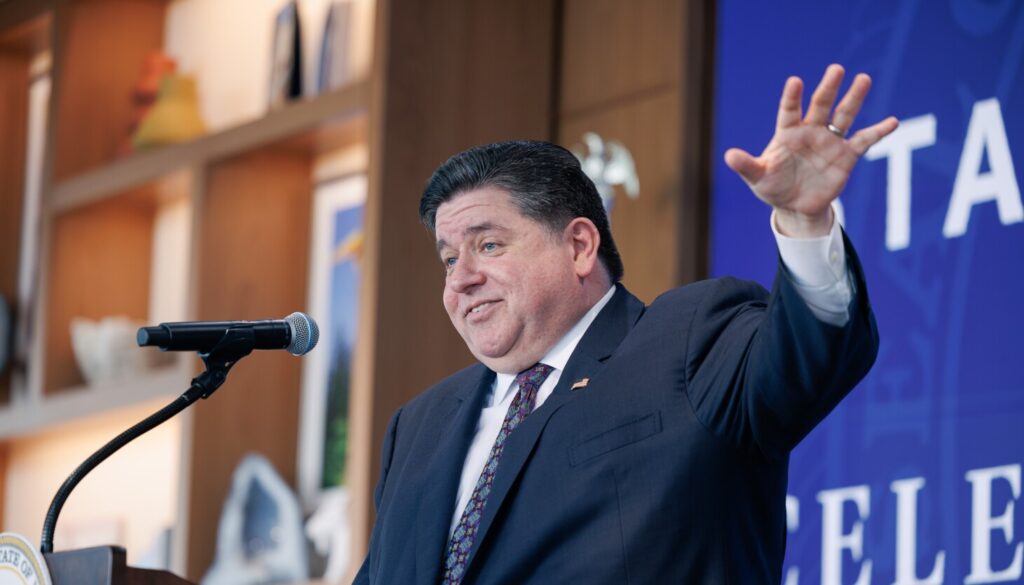Illinois lawmakers have called out the bluff of online sports betting companies who have suggested they may scale back their operations in the state or even shut down altogether under a tougher progressive tax system imposed in Gov. J.B. Pritzker's latest budget.
FanDuel and DraftKings will soon be taxed up to 40% on their net revenues under a spending plan passed by the Illinois General Assembly last week, higher than the flat 15% tax rate that has been imposed on sportsbooks since the state's now multi-billion-dollar sportsbook industry took off in 2020.
The two largest mobile gambling companies, which earned more than $729 million from Illinois gamblers last year and have already increased sales by nearly $250 million so far this year, said the price increases were enough to “reevaluate our level of investment and participation in the state.”
But Pritzker said it's a matter of paying “your fair share,” and experts advise against betting that either gambling giant will actually sell off their Illinois stakes.
“If I were governor, I'd say, 'It's a shame you're leaving. I hope you don't hit the door on your way out,'” said Victor Matheson, an economics professor at the College of the Holy Cross in Massachusetts.
“This is an absolutely incredible threat. Of course they don't want to pay high tax rates but there's no evidence they can't pay them. After all, they're making hundreds of millions of dollars selling a highly addictive product and the government should tax it,” Matheson said.
An army of lobbyists for DraftKings, FanDuel and other big oddsmakers — all banding together as the Sports Betting Coalition — made the hike a tough proposition for lawmakers in the hectic days leading up to the end of the spring legislative session in Springfield.
The governor's proposed 35% across-the-board tax increase has proven to be one of the biggest sticking points in long-term budget negotiations with the Legislature's Democratic majority.
Republicans opposed the bill, but it also raised concerns among Democrats who were wary of penalizing an industry that did more than $1 billion in sales last year and earned $150 million in state tax revenue.

Blackhawks announcer Eddie Olczyk made his first sportsbook bet in Illinois, betting $100 at BetRivers Sportsbook at Rivers Casino in Des Plaines on the morning of Monday, March 9, 2020, on his hometown White Sox winning the American League pennant at 16-to-1 odds.
“This is a tough tax on any industry, much less an emerging industry,” said state Assemblyman Curtis Tarver, D-Chicago, who ultimately voted for the budget to establish a progressive tax on sports betting, similar to the one paid by casinos in Illinois.
Under the tiered system outlined by Pritzker's budget team, sportsbooks would be taxed 20% of revenue after paying out $30 million to winners, 25% of revenue up to $50 million, 30% of revenue up to $100 million, 35% of revenue up to $200 million and 40% of revenue above that.
This will hit FanDuel and DraftKings, the only two of Illinois' 13 sportsbooks that generated more than $100 million in revenue last year, the hardest.
FanDuel paid about $62 million in state taxes on about $411 million in revenue last year, the state's largest windfall, while DraftKings paid about $48 million in state taxes on $319 million in revenue, according to Illinois Gaming Commission records.
Under the tiered system, FanDuel would pay about $145 million to the state and DraftKings would pay $109 million.
Shares of the publicly traded companies fell about 8% and 10%, respectively, earlier this week after lawmakers presented the tax hike proposal to Treasury Secretary Pritzker.
Jeremy Kudon, president of the Sports Betting Alliance, said the new tax rate would be “counterproductive and disadvantageous to sports betting operators who have invested millions of dollars in our local economies and created jobs in the state,” and that operators would “have no choice but to reconsider their operations in Illinois.”
“This tax increase not only threatens our legal and regulated sports betting market, it will have a devastating impact on our casino operator partners across the state, including our most vulnerable casinos in the southern part of the state, who rely on sports betting revenue to create jobs and invest in their communities,” Kudon said.
In a tough budget year, Pritzker's office estimates that the graduated tax system will actually bring the state slightly more in benefits than the $200 million it had anticipated from a flat 35 percent tax rate.
“Governor Pritzker believes Illinois businesses should pay their fair share, and this adjustment will bring the state in line with similar-sized markets and ensure businesses pay their fair share,” a spokesperson for Governor Pritzker said in an email.
In New York, the largest gambling state in the U.S., sportsbooks pay a whopping 51% tax on online betting winnings. Rates range from about 36% in Pennsylvania, 20% in Ohio, 13% in New Jersey and 7% in Nevada.
Matheson's research on the sports betting market found no correlation between state taxes and the amount people bet.
“Many states rushed to introduce sports betting and taxed it very low, and in New York, gambling businesses are still raking in the profits,” he said. “It's only natural that we should demand higher taxes on the gambling industry to help reduce the harms of addiction.”


